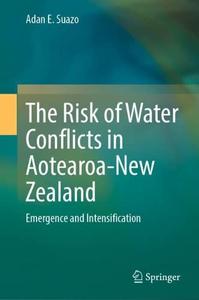

E-Books →The Risk of Water Conflicts in Aotearoa-New Zealand Emergence and Intensification
Published by: voska89 on 9-07-2022, 05:32 |  0
0

The Risk of Water Conflicts in Aotearoa-New Zealand: Emergence and Intensification by Adan E. Suazo
English | PDF | 2022 | 135 Pages | ISBN : 3031066596 | 3.6 MB
This book focuses on water disputes in New Zealand: a country where such conflicts are assumed to be non-existing. Rarely are water disputes examined in areas where water resources abound, and where the political framework that governs their access and use is strong.
This book focuses on water disputes in New Zealand: a country where such conflicts are assumed to be non-existing. Rarely are water disputes examined in areas where water resources abound, and where the political framework that governs their access and use is strong.
Environmental security literature has devoted a significant amount of attention to the nexus between resource abundance and conflict. Important research has assessed this relationship by focusing on non-renewable resource wealth as a causal determinant of conflict, but little is known about the conditions that influence the emergence and intensification of conflict in water abundant environments. By most accounts, New Zealand is one of the most water-rich countries in the world. Even though violent conflict over water does not normally materialize in New Zealand, conflicts and incompatible claims motivated by water bottling, the growth of some types of agriculture, tourism, and water treatment strategies, continue to surface. Little, however, is known about how and why these conflicts emerge and intensify in a country such as New Zealand. To address this lacuna, this project asks the following research question: How and why does the commercialization of freshwater influence the emergence and intensification of hydropolitical conflict in New Zealand? This study presents two central arguments. First, that the introduction of a commercial enterprise motivates the emergence of hydropolitical conflict intentionality if the enterprise is incompatible with the interests of local communities. And second, hydropolitical conflict risk intensifies in accordance with the level of trust that communities pose upon the approval and appeals process that supports a commercial operation. To test these arguments, this study examines the effects of water bottling and water chlorination on the towns of Ashburton (Canterbury) and Glenorchy (Otago), by employing a tripartite analysis comprised, first, of a conflict intentionality and engagement assessment, second, of a comparative case study analysis, and third, of a conflict intentionality classification. The data suggests that hydropolitical conflict risk is low when communities trust the approval and appeals process behind any given commercial operation. Water-based conflict risk however is likely to escalate when local communities lose trust in the above processes and the institutions that administer them.
Buy Premium From My Links To Get Resumable Support,Max Speed & Support Me
https://hot4share.com/o2ch6p3c0vux/ej1fh.T.R.o.W.C.i.A.Z.E.a.I.rar.html

https://uploadgig.com/file/download/19bd46bb08E0eA88/ej1fh.T.R.o.W.C.i.A.Z.E.a.I.rar

https://rapidgator.net/file/652948eeb42976d25163b4a27dad17ea/ej1fh.T.R.o.W.C.i.A.Z.E.a.I.rar.html

https://nitro.download/view/429D46D75ADF218/ej1fh.T.R.o.W.C.i.A.Z.E.a.I.rar[/url]
Links are Interchangeable - No Password - Single Extraction
Related News
-
{related-news}

